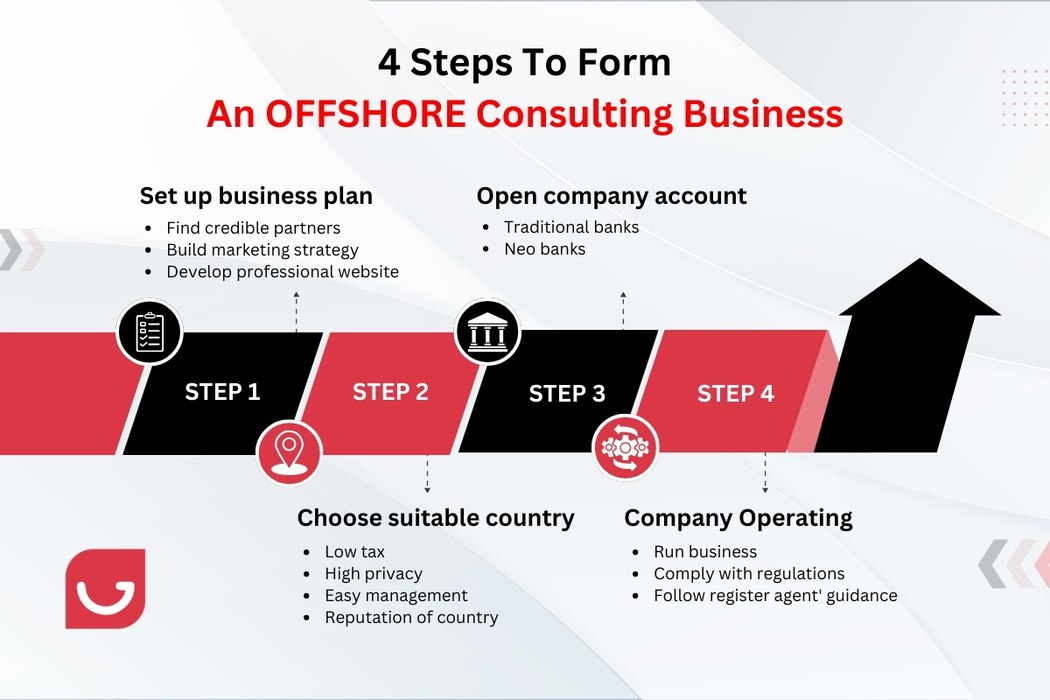Comprehending Offshore Firm Formations: A Comprehensive Guide to the Process and Benefits
Offshore firm formations provide a tactical method for entrepreneurs looking for to maximize their company operations. These entities typically supply benefits such as tax obligation advantages, increased privacy, and robust property protection. Understanding the ins and outs of selecting a territory, the development process, and compliance requirements is crucial. As the landscape of global business advances, the implications of developing an overseas firm warrant mindful factor to consider. What steps should one require to browse this complicated terrain?
What Is an Offshore Firm?
An overseas firm is a service entity integrated outside the territory of its owners' house, typically in a nation with positive governing and tax obligation environments. These firms can offer various purposes, including property security, worldwide trading, and riches monitoring. They are commonly established in territories called tax places, where corporate tax obligation rates are missing or reduced, and privacy laws are strict.
Offshore firms might be possessed by people or other business entities and can operate in different markets, consisting of shopping, financing, and consulting. While they provide specific advantages, the legal and governing frameworks regulating offshore business differ considerably by territory. Company owner need to navigate these complexities to assure compliance with both regional and international laws. Understanding the framework and function of overseas business is essential for individuals considering this choice for company operations or possession monitoring.
Advantages of Forming an Offshore Firm
While the decision to form an overseas business may come from various tactical considerations, the possible advantages are compelling for lots of local business owner. One considerable benefit is tax obligation optimization; several overseas territories provide beneficial tax obligation rates and even tax obligation exceptions, permitting business to retain even more revenues. Furthermore, offshore companies frequently supply improved privacy protection, securing the identifications of investors and supervisors from public analysis.


Last but not least, local business owner might locate operational flexibility, as offshore jurisdictions regularly have less regulatory difficulties, enabling structured management and administration. Collectively, these advantages make offshore business formations an eye-catching option for several seeking to expand their organization horizons.
Selecting the Right Jurisdiction
Picking the proper territory for an overseas business is an essential action in making best use of the advantages outlined previously. Different factors influence this choice, consisting of tax laws, corporate laws, and the general service atmosphere. Jurisdictions such as the British Virgin Islands, Cayman Islands, and Singapore are usually favored for their desirable tax regimes and durable lawful structures.
It is very important to take into consideration the particular demands of business, such as personal privacy demands and regulatory conformity. Additionally, the convenience of working, including the effectiveness of business enrollment and banking centers, plays a substantial duty.
Prospective proprietors need to also examine the political stability and credibility of the picked jurisdiction, as these elements can influence long-term success. Ultimately, comprehensive research study and expert examination are suggested to assure alignment with the business's goals and to leverage the full possibility of offshore benefits.

The Offshore Firm Development Process
The overseas business development procedure entails a series of crucial actions that call for careful preparation and execution. Originally, individuals or companies need to select an appropriate territory that straightens with their goals, thinking about variables such as tax obligation advantages, personal privacy, and regulatory environment. Following this, the following step entails selecting the suitable organization structure, such as an International Service Firm (IBC) or Restricted Obligation Firm (LLC)
As soon as the structure is figured out, needed records, including an organization strategy, identification, and evidence of address, must be prepared. Engaging a reliable regional representative or company can improve this phase, making certain compliance with regional regulations. After submitting the required documentation to the pertinent authorities, the development process normally culminates in the issuance of a certification of incorporation. This document establishes the company as a legal entity, enabling it to conduct business worldwide.
Legal Needs and Compliance
Understanding the legal demands and conformity responsibilities is essential for anybody aiming to establish an overseas firm. Each territory has specific policies that must be stuck to, which can consist of firm enrollment, getting essential licenses, and keeping neighborhood addresses. Offshore Company Formations. It is essential to assign a registered agent that can promote interaction with local authorities and warranty compliance with ongoing coverage requirements
Additionally, numerous jurisdictions call for the submission of annual financial declarations, together with tax obligation filings, also if the company does not create income. Supervisors and shareholders must be recognized, with due diligence procedures usually mandated to verify their identifications. Failing to meet these lawful obligations can lead to penalties or the dissolution of the business. Consequently, possible offshore firm proprietors need to talk to lawyers experienced in worldwide service law to browse these intricacies properly and guarantee full conformity with all policies.
Tax Obligation Ramifications of Offshore Business
The tax obligation implications of offshore companies existing significant advantages that attract several entrepreneurs. Understanding the linked conformity needs is necessary for navigating the complexities of international tax laws. This section will explore both the prospective benefits and the required responsibilities associated to offshore service frameworks.
Tax Obligation Benefits Overview
Although overseas companies are usually watched with uncertainty, they can supply substantial tax benefits for companies and individuals looking for to optimize their economic methods. Among the main benefits is the capacity for reduced company tax prices, which can cause significant financial savings. Numerous overseas territories provide positive tax routines, consisting of absolutely no or marginal tax obligation on revenues, resources gains, and inheritance. Furthermore, overseas firms can promote international organization procedures by lowering tax obligations linked with cross-border deals. This structure may additionally allow tax obligation deferral opportunities, enabling earnings to expand without immediate tax. Inevitably, these benefits add to boosted monetary effectiveness and asset defense, making offshore companies an appealing option for savvy financiers and entrepreneurs.
Compliance Requirements Clarified
Offshore business may present tax advantages, yet they also feature a collection of conformity demands that must be very carefully browsed. These entities are subject to certain reporting obligations, which vary significantly relying on the jurisdiction. Generally, offshore firms must maintain precise financial records and submit yearly financial statements to abide by regional laws. In addition, several territories need the disclosure of valuable possession to fight money laundering and tax evasion. Failure to comply with these conformity actions can result in serious charges, including penalties and prospective loss of organization licenses. Comprehending the local tax obligation laws and worldwide agreements is vital, as they can affect tax responsibilities and total functional validity. Engaging with economic and lawful specialists is recommended to assure complete compliance.
Keeping and Managing Your Offshore Business
Maintaining and taking care look at this web-site of an overseas firm includes adhering to numerous recurring conformity demands vital for legal procedure. This includes thorough financial record keeping and an understanding of tax responsibilities relevant to the company's territory. Reliable administration not only guarantees regulative conformity however additionally supports the company's monetary wellness and durability.
Ongoing Compliance Needs
Guaranteeing continuous compliance is crucial for any entity operating in the offshore field, as failing to meet regulative needs can bring about significant charges and even dissolution of the company. Offshore companies should follow local regulations, which may consist of yearly declaring of economic declarations, settlement of necessary charges, and maintaining an authorized workplace address. Furthermore, companies are commonly required to designate a neighborhood representative or representative to help with communication with authorities. Normal updates on adjustments in legislation or tax obligation demands are important for conformity. Moreover, adherence to anti-money laundering (AML) and know-your-customer (KYC) laws is critical. By keeping arranged documents and remaining educated, offshore business can ensure they stay certified and mitigate dangers linked with non-compliance.
Financial Document Keeping
Reliable monetary record maintaining is vital for the successful monitoring of any kind of overseas firm. Preserving accurate and comprehensive economic records aids in tracking the company's efficiency, guaranteeing compliance with neighborhood laws, and promoting notified decision-making. Business must apply systematic processes for recording revenue, expenses, and deals to produce openness and accountability. Using accounting software program can streamline this procedure, enabling real-time economic analysis and coverage. Routinely reviewing monetary declarations assists determine trends, assess earnings, and take care of capital successfully. It is essential to safely save these documents to safeguard delicate details and guarantee simple gain access to throughout audits or financial testimonials. By prioritizing thorough financial record keeping, offshore business can enhance functional effectiveness and assistance long-lasting success.
Tax Obligations Review
Understanding tax obligation responsibilities is vital for the correct administration of an offshore company, as it directly affects financial performance and conformity. Offshore companies may go through different tax regulations relying on their jurisdiction, including corporate taxes, value-added tax obligations, and withholding tax obligations. It is crucial for entrepreneur to stay informed concerning their tax obligation obligations, as failing to conform can bring about penalties and lawful problems. In addition, many offshore territories use tax motivations, which can greatly try this profit businesses if navigated properly. Engaging an educated tax expert or accountant focusing on international tax obligation law can assist ensure that business fulfill their commitments while enhancing their tax approaches. Inevitably, diligent tax obligation monitoring adds to the general success and sustainability of an offshore entity.
Regularly Asked Questions
Can I Open Up a Financial Institution Account for My Offshore Company Remotely?
The capability to open a savings account for an overseas business from another location relies on the financial institution's policies and the territory's laws. Numerous financial institutions offer remote solutions, however specific demands may differ substantially between institutions.
What Are the Prices Associated With Developing an Offshore Company?
The expenses entailed in forming an offshore business typically include registration fees, legal and consulting expenditures, and ongoing upkeep fees. These expenses differ significantly based on jurisdiction, intricacy of the business framework, and specific solutions needed.
Exist Constraints on Who Can Be a Shareholder?
Constraints on investors vary by jurisdiction. Some nations might impose constraints based upon nationality, business, or residency type - Offshore Company Formations. It's vital for potential investors to research particular policies applicable to their picked offshore area
For how long Does the Offshore Company Formation Process Usually Take?
The offshore firm formation process commonly takes between a couple of days to numerous weeks. Variables influencing the timeline include jurisdiction needs, paper preparation, and responsiveness of relevant authorities included in the registration procedure.
What Occurs if I Fail to Follow Regional Regulations?
Failure to follow neighborhood legislations can result in serious charges, consisting of fines, lawful activity, or loss of business licenses - Offshore Company Formations. It may also damage the company's online reputation and prevent future service possibilities in the territory
An overseas business is a business entity included outside the jurisdiction of its proprietors' house, usually he has a good point in a country with beneficial governing and tax atmospheres. One substantial advantage is tax obligation optimization; several offshore jurisdictions supply desirable tax prices or even tax obligation exemptions, enabling companies to retain even more profits. Overseas companies are usually watched with uncertainty, they can supply substantial tax obligation advantages for companies and individuals looking for to maximize their monetary methods. Furthermore, offshore firms can facilitate international business procedures by minimizing tax obligation responsibilities linked with cross-border purchases. Offshore firms may be subject to numerous tax obligation legislations depending on their territory, consisting of business taxes, value-added tax obligations, and withholding taxes.